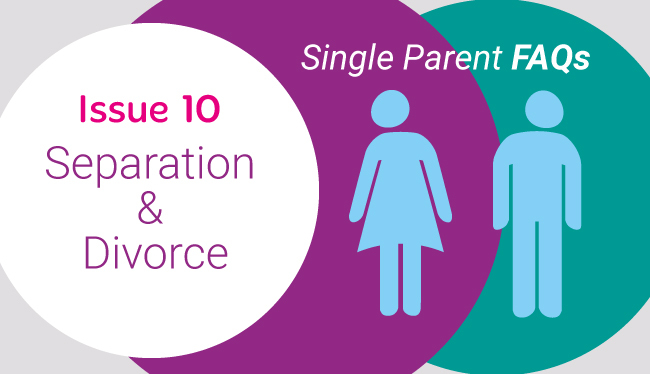Single Parent FAQs: Separation & Divorce

24/01/2022
Our advice and information team who work on our Lone Parent Helpline, webchat and Ask a Question feature, receive questions from single parents around Scotland every day.
Our new feature – Single Parent FAQs – on our newsletter and blog spotlights Frequently Asked Questions on a different topic each month.
This month, our advice team have been receiving a lot of calls from single parents regarding Separation & Divorce.
Take a look at the FAQ's
I’m thinking about separating from my partner, I don’t have any income or saving’s can I claim any benefits?
If you have no income or savings, you may be able to claim universal credit and some other benefits, more information can be found here.
I have separated from my children’s dad, but I don’t know how to arrange contact?
Arranging contact can be difficult for newly separated families, if possible, try and arrange contact between yourselves and if this is not possible you could try mediation.
How do I decide who takes the belongings and who is liable for the debts from the relationship?
As well as your home there may be other property, assets, belongings, and debts that you and your ex-partner need to consider. How your belongings and assets are divided can depend on whether you are married, in a civil partnership or living together among other things. It is always best to get advice.
My ex-partner is refusing to pay child maintenance we have been separated 4 months now, will I get the child maintenance backdated?
The best way to arrange child maintenance payments is for both parents to agree on an amount. There is no calculation that needs to be considered if it is done this way. This informal agreement is not legally binding so it is flexible and can change when circumstances do. Unfortunately maintenance payments would not have to be backdated because there has been no arrangements, going forward you could get in touch with Child Maintenance Options.
My partner and I are in the process of separating, we have managed to sort most things, however we are unsure how we tell the children?
Lots of parents contact us for advice about how to talk to their children about divorce and separation. This can be a difficult and emotional time for the whole family. We hope that you are getting the support you need to cope. You can find tips and book suggestions here.
My ex-partner has been violent and abusive all the way through our relationship, but the court says children must see their dad, can I ask a family member or friend to meet with him to hand over the children?
Your and your child’s safety and wellbeing are vital, when your ex-partner has committed any for of abuse against you or your children contact, and handover can be difficult so asking a family member to help with this will relive you of stress and make the handover for the children better too.
I separated from my husband 6 months ago and my 13-year-old daughter has now started self-harming and I don’t know what to do or where to go for help?
It may be worthwhile letting the other people your children have contact with, such as child minders or teachers, know that your children may be upset. This will allow them to be prepared and to look out for, and let you know of, any behaviour that may be a cause for concern.
Your children’s school may be able to refer your children to support services if need be or your GP can refer to family counselling services although there could be a waiting list. You could see if your daughter could access Childline lots of info and advice.
We are living at my husband’s parents house just now, and I have no money or furniture and I’m only working part time, where can I get help to pay rent and help with items to furnish a home for me and my children, I have no savings.
There are different housing options, and you can get help through Universal Credit housing element to help with rent. The Scottish Welfare Fund can help with items for your home and you can find more info on items you can apply for here.

See our previous issues of Single Parent FAQs on:
- Having a baby
- Housing options
- Child maintenance
- Child contact
- Universal Credit
- Getting back into education as a single parent
- Financial support for single parents
- Bridging payments and help for Christmas
- Social Security Scotland
Remember you can submit your own question via the Ask A Question feature on our website any time and our expert advisers will respond.